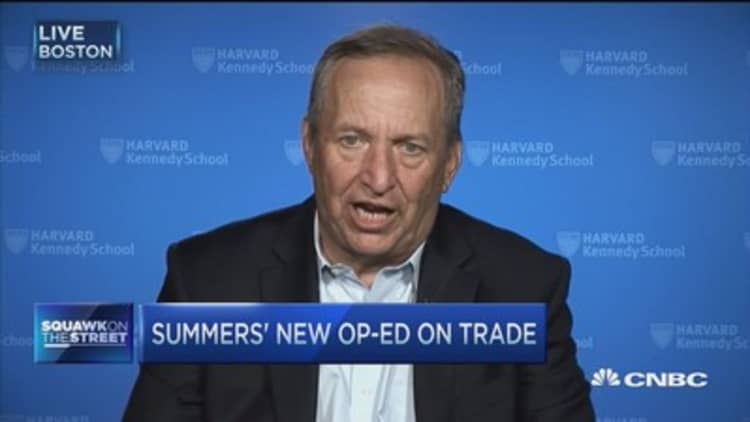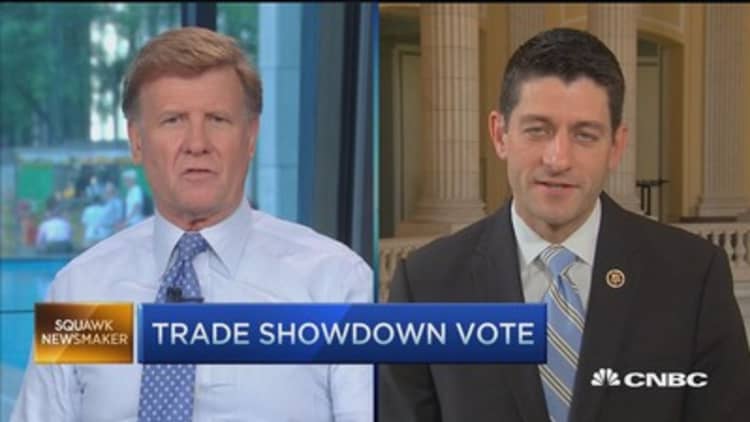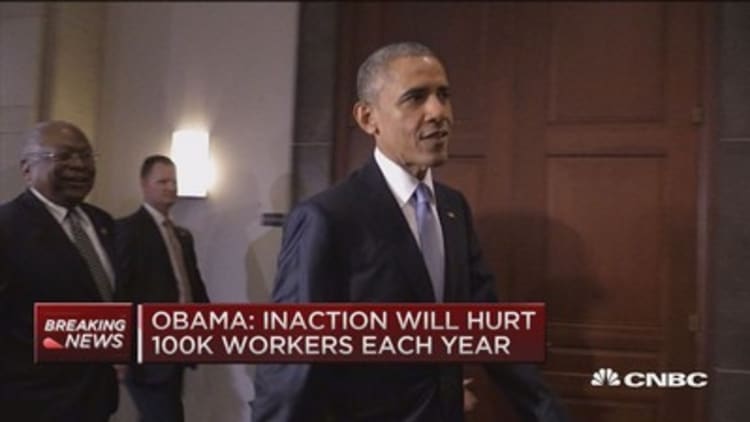


The U.S. House of Representatives is expected to take up a second vote for an important Pacific trade bill this week, but even if it fails, President Barack Obama still has several options for making his long-planned agreement a reality.
On Friday, the House voted down Trade Adjustment Assistance, one part of a legislative package that would grant Obama so-called fast-track authority on international trade agreements. That authority—which experts say is necessary for getting a Pacific trade deal off the ground—was tied to the TAA bill, and fell into limbo on Friday.
Read MorePacific trade: Why DC is fighting about 'fast-track'
The TAA bill would continue a program that helps workers whose jobs have been hurt by international trade agreements. Democrats, who have historically been the champions of the program, did not rally to support it this time, openly defying Obama in order to stymie his trade agenda. The House (with the help of Republicans) then proceeded to vote in favor of giving the president fast-track authority—a ballot that meant little without TAA's passage.
As for where the president's "fast-track" aspirations can go from here, there are likely three options facing the White House and its Republican allies if this week's recount fails, according to Scott Miller, senior advisor and Scholl Chair in International Business at the Center for Strategic and International Studies
- Miller said the most likely option would be that the House says it disagrees with the Senate's bill tying fast-track authority with the TAA program. If that happens, the chamber can request a conference committee wherein members from both the Senate and the House hash out their differences, and then send out compromise bill back to their floors.
- The second choice would be for the House to engage in legislative "pingpong," sending an amended bill back to the Senate without any TAA component. But that would set the situation back to April, when that chamber opted to combine fast-track with the assistance program in the first place.
- Finally, the House could opt to scrap the current bill, and take up the issue of fast-track in a new vehicle—such as one sponsored by Rep. Paul Ryan, R-Wis.
But none of those options may even be necessary, as the Obama administration expressed confidence that it would get the job done in the House: White House press secretary Josh Earnest said Friday that TAA's failure was simply a "procedural snafu."
Still, the stakes are high for Obama's fast-track push.
"If the United States is not able to carry through, that will raise questions about the capacity for presidential leadership both for the remainder of this presidential term and going forward," former U.S. Treasury Secretary Larry Summers Monday on CNBC's "Squawk on the Street."

"Trade Promotion Authority" means the legislative branch would be able only to approve or reject such a deal, rather than alter it. Most experts agree it's a necessary step for getting other countries to sign on to the pact themselves.
"No other country in the world wants to be in the position of negotiating first with the president, and then with a Congress whose behavior can't be predicted," Summers added.
Administration officials told CNBC earlier this year that they felt a deal with 11 other countries—called the Trans-Pacific Partnership—could still happen without fast-track authority, but Miller was skeptical.
Read More Summers: Trade defeat will make world more dangerous
Even with presidential Trade Promotion Authority, the U.S. went back and renegotiated some components of its South Korean trade agreement, he said, and Japan (considered to be the Pacific deal's biggest prize) is wary of leaving its economic fate up to Congress.
"Are they going to do this without any protection? I think not. They've seen how we treat people," Miller said.
The State Department declined a request for comment on the effect of the congressional drama on the trade negotiation process.
The Trans-Pacific Partnership would include about 40 percent of the global economy, and roughly one-third of worldwide trade, according to the Brookings Institution.


